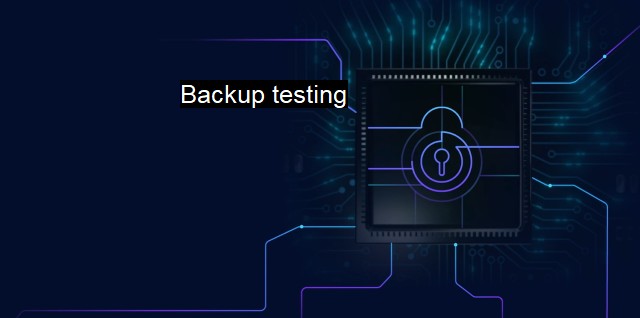What is Backup testing?
Importance of Backup Testing in Cybersecurity and Antivirus Systems: A Detailed Overview of its Characteristics and Significance
Backup testing is an essential aspect that is often overlooked. Backup testing refers to the process through which an organization verifies the reliability and effectiveness of their system back up operations, ensuring the saved data can be accurately restored.In the modern landscape of pervasive cyber threats, having reliable data backup not only serves as an insurance policy against data loss due to hardware or network failures but also against cybersecurity positioning. Given the rising threat of attacks such as ransomware or data theft, where an attacker may compromise an organization's information, efficient and effective backup systems can prove invaluable. possessing a backup system does not automatically guarantee safety. How it recovers data, especially following a security attack, is crucial – this is where backup testing comes into play.
Backup testing aims to ascertain that data backup can fulfill its primary role – that in the event data is lost, whether due to system error, cyberattacks or inadvertent deletions, it can be retrieved in its complete, undamaged form. Without testing and confirmation, there is justifiable room for doubt in the backup system's validity. Consequently, any serious cybersecurity framework places consistent and scheduled backup testing as a priority.
Performing backup tests involves emulating a data loss scenario and then implementing data recovery through the deployed backup controls. There are several ways in which such scenarios can be enacted, ranging from basic file recovery procedures to full-blown disaster recovery simulations. Some essential type of tests includes the full recovery test which simulates a complete system failure, and a data recovery test that focuses on the system's capacity to recover specific datasets.
To conduct backup testing testers usually mimic cyber threats using test environments. An essential part of the process involves creating scenarios that reflect real-world risks. For instance, simulating the latest strains of ransomware or data deletion errors can provide actionable insights about how the backup systems can hold up under pressures. In these cases, antivirus software plays a pivotal role in limiting the damage and preventing similar breaches from recurring.
Consistency is paramount in backup testing. Ad hoc or irregular exercises can leave gaping holes in the understanding of how well backup systems deal with emerging threats. With the fast-paced evolution of viruses and malware, a past successful test does not guarantee future security. Thus, regular and repeated backup testing should be an essential part of any rigorous cybersecurity protocol.
Inadequate backup testing may put organizations at significant risk. For instance, assumptions seem valid, believing their backups are working perfectly only because there's no apparent malfunction. such beliefs often crumble when faced with an actual data loss incident. Without an ironclad confirmation of the backup system's effectiveness through repeated tests, the aftermath of a data breach could be catastrophic.
Backup testing needs to be integrated with general cybersecurity policies and procedures. It is essential to test backups whenever there's a change in structure or data like a system overhaul or following a security attack. Because these occurrences can impact the efficiency of backup systems, they require follow-up tests to reassess their effectiveness.
Backup testing is a critical aspect of cybersecurity. It ensures that data loss does not devastate an organization, either financially or operationally. A robust backup testing strategy mitigates the risk against various technology-driven threats, shields business continuity against issues like corruption, deletions, or information theft. Integrating backup testing into a consistent cybersecurity regimen allows organizations to map out vulnerabilities and helps ensure that their operations remain unsurprisingly and uncompromisingly secure.

Backup testing FAQs
What is backup testing?
Backup testing is the process of verifying and evaluating the effectiveness of backup and recovery procedures. It involves testing the ability of the backup system to restore data and systems to their previous state in the event of a cyber attack or other data loss incidents.Why is backup testing important in cybersecurity?
Backup testing is critical in cybersecurity because it ensures that your backups are functional and reliable when you need them. It is a proactive measure that helps organizations to recover from cyber-attacks, minimize data loss, and reduce downtime in the event of a disaster or system failure.How often should backup testing be performed?
Backup testing should be performed on a regular basis to ensure that the backup system is functioning properly. The frequency of backup testing depends on various factors such as the type of data being backed up, the size of the organization, and the level of cybersecurity risk. It is recommended to perform backup testing at least once a quarter, if not more frequently depending on the risk profile.What are the benefits of performing backup testing?
Performing backup testing helps organizations to identify gaps and weaknesses in their backup and recovery procedures. It provides assurance that critical data and systems can be restored in the event of an attack or data loss, which ultimately reduces downtime and financial losses. Backup testing also helps organizations to comply with regulatory requirements and industry best practices.| | A | | | B | | | C | | | D | | | E | | | F | | | G | | | H | | | I | | | J | | | K | | | L | | | M | |
| | N | | | O | | | P | | | Q | | | R | | | S | | | T | | | U | | | V | | | W | | | X | | | Y | | | Z | |
| | 1 | | | 2 | | | 3 | | | 4 | | | 7 | | | 8 | | |||||||